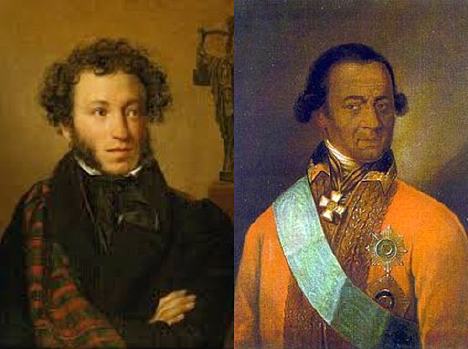Race and Russian Studies in The Russian Review

Alexander Sergeyevich Pushkin (left) and Abram Petrovich Gannibal (right). Pushkin, Russia’s most famous poet, was the great-grandson of Gannibal, a Russian military engineer, general, and nobleman of African origin.Gannibal was kidnapped as a child by the Ottomans, taken to Russia in 1704, and presented as a gift to Peter the Great, who adopted him and raised him as his godson.
An article collection curated by Kamal Kariem
During the COVID-19 pandemic, anti-Black violence and racial violence more broadly reached new levels of visibility. As protests continue around the United States, it is a time for reflection. Reflection on how the United States came to this point. Reflection on our roles in reproducing systems of violence and murder that generate a state of double-consciousness, forcing a segment of the population to look “at one’s self through the eyes of others, of measuring one's soul by the tape of a world that looks on in amused contempt and pity” as W. E. B. Du Bois phrased it (2008). Reflection on the successful strategies and solidarities of the past, which may benefit the present and the future.
It should also be a time of reflection on how academic disciplines address race and racism as they relate to Blackness and other forms of racial identity.
The need to reflect on race is particularly crucial within the field of Russian studies. While racial identity had been relatively neglected by the field for years, a series of events on race and Russia took place in 2020. These events included Thinking Race in the Russian and Soviet Empires Symposium sponsored by the University of Illinois at Chicago and the University of Chicago; Race in Focus: From Critical Pedagogies to Research Practice and Public Engagement in Slavic, East European, and Eurasian Studies sponsored by the University of Chicago; and the Russia and Race Lecture Series sponsored by the University of Kansas. This trend must continue.
Since its inception in 1941, The Russian Review has focused on Russia’s diversity. The journal drew its readers’ attention to various ethnic groups in Russia and the USSR, exploring how these groups shaped their relations to Russianness while struggling with their place in the Russian empire, in its various forms. The term “race” has been used in different ways throughout the journal’s history, but the understanding of race and racialization was not unanimously shared in the field. Some scholars continue to argue that race has not been a significant category of difference in Russia. Others seek to understand its manifestations in the past and present.
Over the years, the journal has served as a forum for debates that examined and interrogated race and racialization in Russia. In 2016, The Russian Review published a cluster of articles, African Americans in Early Soviet Culture, that traced connections between Black Americans and the Soviet Union. Following this important example, I curated the following online collection of articles, Race and Russian Studies in The Russian Review.
This collection is not exhaustive, and its three sections are designed to demonstrate that “race” does not have one stable meaning. However, by bringing these articles into a dialogue, I want to draw attention to instances and processes that have made race matter. With the help of previously published scholarship, I hope to highlight different practices of racialization and de-racialization in Russia’s history as well as in Russian studies.
My main motivation behind this collection is not entirely academic. Reflection without action tends to be self-serving. So the ultimate question is this: How can we move from reflecting on race and racialization in Russia to action, both in the discipline, by bringing race and other forms of difference to the fore of our scholarship, and in a country where racism, xenophobia, and racial violence continue to occur?
The collection is organized around three broad but interrelated themes: Category Slippages, Comparative Contexts and Priorities, and Nested Hierarchies. Readers are encouraged to view all three by clicking on the links below; those still curious to learn more can explore the original articles published in The Russian Review.
- Category Slippages: Race, Nationality, and Ethnicity within Russia
- Comparative Contexts and Priorities: Transnational Exchanges and International Solidarity
- Nested Hierarchies: Whiteness, Europeanness, Russianness, and their Others
Grappling with Russia’s diversity remains a challenge. As the authors and articles discussed show, categories of race, ethnicity, and nationality have been often discussed together. Within this terminological web, as Nikolay Zhakharov suggests in his 2015 book Race and Racism in Russia, slippages between the categories of race and nationality could occur because of the primordialist understanding of nationality established during the Russian Empire and carried over into the USSR.
Zhakharov, however, stresses that Russian intellectuals – unlike their European colleagues – tended to see the social aspect in the Nature/Culture debate as much more significant. For example, Petr Chaadayev, an important nineteenth-century intellectual, did not question race but he did question the divisions that the category of race introduced:
No one doubts that races exist; no one would dispute that the various races have entered the necessity of their origins into the body of knowledge accumulated on Earth... But as soon as this is made clear, another issue arises. It is now a question of discovering whether it is necessary that races be preserved forever. Should we strive for a common fusion of all nations, or, on the contrary, should Mongols remain Mongols, Malaysians – Malaysians, Negroes – Negroes, Slavs – Slavs?
As we know, Chaadayev’s appeal for unity did not completely succeed: race and racism persist in Russia to this day. However, his thoughts generate useful questions for analyzing race and racialization in Russia: Which differences are viewed as immutable and insurmountable? What are the implications and results, including targeted violence, of being perceived along these lines? Such questions help us to comprehend race and racialization, even when they are disguised by the language of nationality and ethnicity.
About the Author
 Kamal Kariem is a Ph.D. Candidate in Anthropology at Princeton University. His primary research interests lie at the intersections of indigeneity, protected areas, Russia, and post-Socialism. He investigates the histories and present(s) of environmental governance in the Russian Far East by grappling with the ways that conservation projects and nature protection more generally configure social relations, notions of self and tradition, and expand beyond conservation. Viewing conservation as both constitutive of and constituted in fields of power, Kamal interrogates how these fields of power impact locals—both indigenous and otherwise. Broadly, Kamal’s research interrogates the relation of environmental governance in Russia to changing forms of subjectification in the Anthropocene.
Kamal Kariem is a Ph.D. Candidate in Anthropology at Princeton University. His primary research interests lie at the intersections of indigeneity, protected areas, Russia, and post-Socialism. He investigates the histories and present(s) of environmental governance in the Russian Far East by grappling with the ways that conservation projects and nature protection more generally configure social relations, notions of self and tradition, and expand beyond conservation. Viewing conservation as both constitutive of and constituted in fields of power, Kamal interrogates how these fields of power impact locals—both indigenous and otherwise. Broadly, Kamal’s research interrogates the relation of environmental governance in Russia to changing forms of subjectification in the Anthropocene.